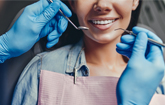Penn Dental, Penn Engineering Unite to Form Center for Innovation & Precision Dentistry
PHILADELPHIA, April 13, 2021 /PRNewswire/ -- With the shared vision to transform the future of oral health care, Penn Dental Medicine and Penn's School of Engineering and Applied Sciences have united to form the Center for Innovation & Precision Dentistry (CiPD). Conceived and brought to fruition by co-directors Dr. Michel Koo of Penn Dental Medicine and Dr. Kathleen Stebe of Penn Engineering, the CiPD is bridging the two schools through cutting-edge research and technologies to accelerate the development of new solutions and devices to address unmet needs in oral health, particularly in the areas of dental caries, periodontal disease, and head and neck cancer. The CiPD will also place a high priority on programs to train the next generation of leaders in oral health care innovation.
"There is an urgent need to find better ways to diagnose, prevent, and treat oral diseases, particularly in ways that are affordable and accessible for the most susceptible populations," says Dr. Koo. "That is our driving force for putting this Center together."
"We have united our schools around this mission," adds Dr. Stebe. "We have formed a community of scholars to develop and harness new engineering paradigms, to seek new approaches to address oral health. More importantly, we will train a new community of scholars to impact this space."
Three of the CiPD primary partners will play key roles in the Center's funding opportunities to promote research, training, and entrepreneurship focused on translatable technologies to study disease mechanisms and to develop precision diagnostics and affordable therapeutics to promote oral-craniofacial health. They include Penn Health-Tech Center for Health, Devices and Technology, Penn Institute for Biomedical Informatics and Penn Center for Innovation. The fourth primary partner is Penn Dental's Center for Clinical and Translational Research.
Both Drs. Koo and Stebe stress that the training programs in development will be fundamental to the transformational impact they hope to achieve. And, in the realm of collaborative research, studies are progressing that include, among others: microrobots that clear dental plaque from tooth surfaces and remove biofilms from root canals; customized N95 respirators that use 3D face scans for improved function and comfort; portable devices for COVID-19 detection using saliva; artificial intelligence to develop more effective antimicrobials; nanocarriers for drug delivery to precisely target bone diseases; and organ-on-chip technology, mimicking complex and dynamic structures to study oral diseases and new therapies.
Media Contact:
Beth Adams
215-219-5491
[email protected]
SOURCE Penn Dental Medicine

Related Links
WANT YOUR COMPANY'S NEWS FEATURED ON PRNEWSWIRE.COM?
Newsrooms &
Influencers
Digital Media
Outlets
Journalists
Opted In





Share this article